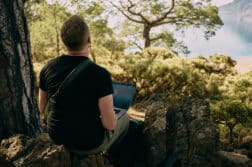If you’re a Canadian student considering working in Australia, there are a few things you need to do for a smoother process. From obtaining the proper visas and work permits to understanding the cultural differences in the workplace, this guide will provide lots of great information on how to prepare to work in Australia.
What Courses Should A Canadian Student Take To Get A Job In Australia
While there is no guaranteed course or major that will lead to a job in Australia, certain fields are in demand and may offer more job opportunities. Here are a few fields that may be worth considering:
- Healthcare: Australia has a strong healthcare system and needs healthcare professionals, including doctors, nurses, mental health leaders, and allied health professionals. Consider accredited online MHL programs for transferable skills which will help you further your career in the land down under.
- Information Technology: Australia’s growing tech industry requires skilled workers in software engineering, data science, and cybersecurity.
- Engineering: Australia has a strong mining and resource industry and requires skilled civil, mechanical, and mining engineers.
- Education: Australia has a robust education system and is in need of teachers, especially in rural areas.
- Hospitality and Tourism: Australia has a growing tourism industry due to its popular destinations and is in need of workers in fields such as hospitality, tourism, and event management.
Job opportunities can vary by location, so do your research for the region of Australia you plan to work in. It’s also important to gain relevant work experience through internships, co-op programs, or volunteer work in your field of interest.
Visas and Work Permits
Canadian citizens will need a visa and a work permit to work in Australia, so you’ll need to get this in place before applying for a job. The type of visa will depend on the length of your stay and the kind of work you plan to do. There are several different types of visas available for Canadians who want to work in Australia:
- Working Holiday Visa: If you’re aged between 18 and 30, this visa will allow you to work and travel in Australia for up to 12 months.
- Skilled Worker Visa: This visa is for Canadians with skills in demand in Australia. To be eligible for this visa, you must have a job offer from an Australia-based employer.
- Employer-Sponsored Visa: This visa is for Canadians who have been sponsored by an Australian employer to work in Australia. To be eligible for this visa, you must have a job offer from an Australia-based employer.
- Business Visa: This visa is for Canadians who plan to start a business in Australia or invest in an existing Australian business.
To get the work visa, you must apply through the Australian government’s Department of Home Affairs website. The process can take several weeks or even months, so starting the application process well before your planned departure date is important.
Culture and Work Environment
The workplace culture in Australia is generally relaxed and informal, but it’s important to understand the cultural differences between Canada and Australia. Keep in mind the following:
- Punctuality: Australians tend to be more relaxed about punctuality than Canadians. However, it’s still important to be on time for meetings and appointments.
- Communication: Australians tend to be more direct and informal in their communication style than Canadians.
- Work-Life Balance: Australians value their work-life balance, and it’s not uncommon for employees to take time off for personal reasons.
- Dress Code: The Australian dress code is generally more casual, but it’s still important to dress appropriately for your workplace.
- Respect: Australians value respect and honesty. Treat your colleagues and superiors with respect and to be honest in your communication.
Finding Work
Finding work in Australia can be challenging, especially if you don’t have a job offer before you arrive. Here are a few tips to help you:
- Networking: Networking is key to finding work in Australia. Attend industry events and meet with people in your field.
- Job Boards: Job boards such as Seek and Indeed are a great way to search for job openings.
- Recruitment Agencies: Recruitment agencies can help you find job opportunities in your field.
- LinkedIn: LinkedIn is a great way to connect with people in your field and to find job openings.
- Volunteering: This is a great way to gain experience and make connections in your field.
Cost of Living
The cost of living in Australia is higher than in Canada, especially in cities like Sydney and Melbourne. Take note of these when it comes to the cost of living:
- Accommodation: The cost of rent can be high, especially in the bigger cities. Consider sharing accommodation with others to reduce costs.
- Transportation: Public transportation is generally reliable and affordable in Australia. Consider using public transportation to save on transportation costs.
- Food and Entertainment: Eating out and entertainment can also be expensive in Australia. Find deals and discounts to save money.
- Taxes: Australia has a progressive tax system, which means the more you earn, the more tax you pay. Be sure to budget for taxes when planning your expenses.
Healthcare
Australia has a public healthcare system called Medicare, which provides basic medical services to Australian residents. Canadians working in Australia may be eligible for Medicare, depending on their visa status. It’s important to check with the Department of Home Affairs to determine your eligibility.
If you’re not eligible for Medicare, you may need to purchase private health insurance. Private health insurance can be expensive, so shop around and compare prices.
Working Conditions
Working conditions in Australia are generally good, with a strong emphasis on work-life balance.
- Working Hours: The standard working week in Australia is 38 hours, although some industries may have different working hours. Overtime is generally paid at a higher rate.
- Annual Leave: Full-time employees will receive four weeks of annual leave per year, which can be taken in one block or split up throughout the year.
- Sick Leave: Full-time employees are entitled to 10 days of paid sick leave per year.
- Public Holidays: Australia has ten national public holidays per year, which are paid days off for full-time employees.
- Superannuation: Employers are required to contribute 9.5% of an employee’s salary to a superannuation fund, which is a retirement savings account.
Conclusion
Working in Australia can be a great opportunity for Canadians looking to gain experience, travel, and broaden their horizons. With the right visa and work permit, a good understanding of the culture and work environment, and knowledge of the cost of living and healthcare system, Canadians can have a successful and rewarding work experience in Australia.








Discussion14 Comments
The guidelines are extremely reasonable for international Sonic exe students. It’s great that I can find supporting information.
Ensure that you have the appropriate student visa that allows you to work in Australia. Student visas typically come with work conditions, Uno Online and you are usually allowed to work up to a specified number of hours per week during the academic semester and full-time during scheduled breaks.
Let me simply say that this is a really good and fun game. If you’re bored in your free time, visit this platform for free and begin playing this board game there without having to download anything or register.
Thanks for your great instructions
To put it simply, I think this is a fantastic game. Go ahead and play this board game on this platform without signing up or downloading anything if you’re bored in your spare time.
Great guide for Canadian students aspiring to work in Australia. The breakdown of visa types industry insights and cultural nuances provides a comprehensive overview. Networking and early visa application seem crucial. valuable tips for a successful experience Down Under.
Best Janitorial Services in Pflugerville TX
Test your music knowledge as you listen to beloved 80s hits and race against the clock to guess the song title before time runs out with heardle game.
Depending on their visa status, Canadians employed in Australia may qualify for Medicare. It is crucial to verify their eligibility with the Department of Home Affairs.
Anchor Text
Working in Australia is not so easy for foreigners and this guide for Canadian students is the best as it provides us with the best details that we can use for learning. When I used the stump grinding I saw a lot of people who are searching for the best ideas that provide us the right results.
Working in Australia is not so easy for foreigners and this guide for Canadian students is the best as it provides us with the best details that we can use for learning. When I used the best services I saw a lot of people who are searching for the best ideas that provide us the right results.
Working in Australia is not so easy for foreigners and this guide for Canadian students is the best as it provides us with the best details that we can use for learning. When I used the brisbaneroofrestorationexperts.com.au I saw a lot of people who are searching for the best ideas that provide us the right results.
This guide provides a comprehensive overview for Canadian students considering working in Australia. It’s great to see such detailed information on everything from visas and work permits to the nuances of workplace culture. The emphasis on in-demand fields like healthcare, IT, and engineering is particularly helpful for students planning their studies and career paths. The tips on networking and basketball stars finding work, as well as the insights on living costs and healthcare, are practical and necessary for anyone making this big move. Kudos to the author for covering all the essential aspects to ensure a smooth transition for Canadians heading to Australia!
For anyone just getting started in business, I highly recommend exploring cryptocurrency as part of your strategy. It’s a growing space that offers new opportunities for beginners, and even small investments can lead to substantial returns with the right knowledge. If you’re unsure where to start, I found this https://icoholder.com/blog/setting-sail-into-cryptocurrency-a-beginners-guide-to-buying-digital-assets/. It breaks down key concepts and provides actionable tips for getting into the crypto market safely. Definitely worth a read for anyone looking to diversify their portfolio or start their journey into digital finance!